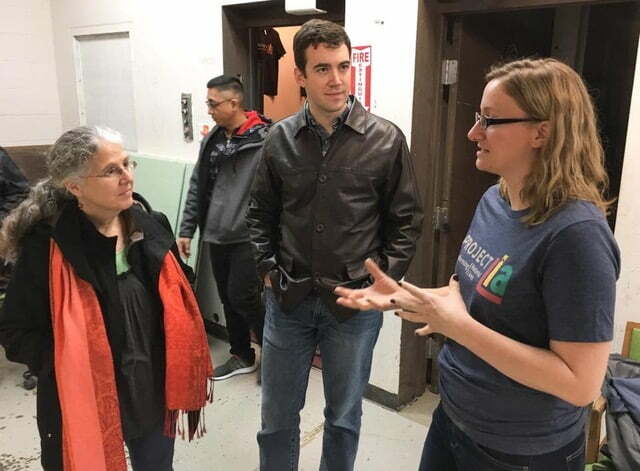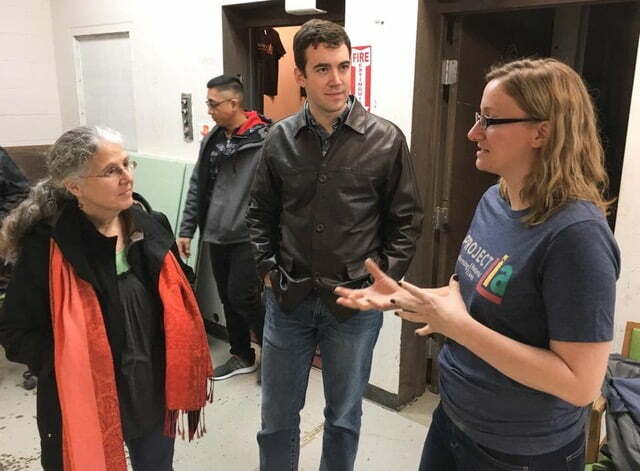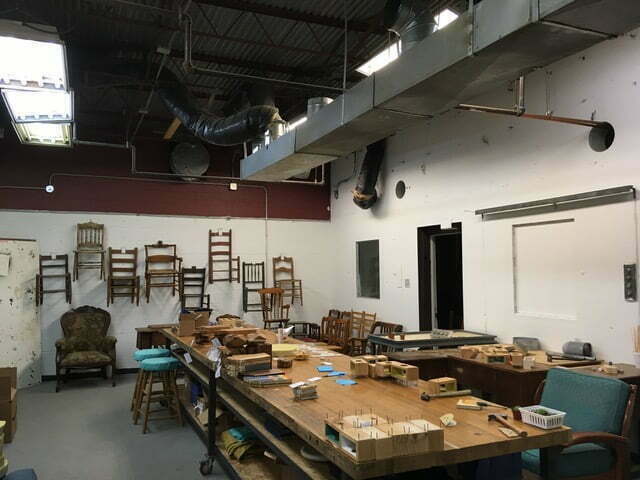Project Lia offers a vision of economic inclusivity on Indianapolis’ Near Eastside by equipping marginalized members of the workforce with the financial literacy, communication, business ethics, and personal care skills that are essential to successful entrepreneurialism and employability. It follows that Project Lia contributes to the fulfillment of the Promise Zone’s Work IndyEast objectives as an initiative that combines industrial reuse [of the Circle City Industrial Complex], entrepreneurship, and job training to teach people the skills and provide them with the wages that are necessary for full participation in the Near Eastside’s ever-growing local economy.
Project Lia employee and visitors to Project Lia’s workshop
Elizabeth Wallin is fervent in her commitment to serving communities wherever she goes. Having contributed to the public good domestically and abroad in many capacities, Wallin’s most recent effort has been Project Lia, a nonprofit organization and social enterprise that seeks to obviate barriers faced by formerly incarcerated women as they navigate the job market. Owing to Wallin’s resourcefulness and persistence, participants in Project Lia who face the stigmas of their gender and history of incarceration, at times compounded by other factors including (but not limited to) race, language barriers, and history of trauma and mental illness, improve their chances of finding stable employment during and after their one-year terms.
Wallin’s trajectory toward her position as the Executive Director of Project Lia began upon her return to the United States from extended stays in Ecuador and Argentina, which imparted many formative experiences in public service and community-building upon her. She had settled in Indianapolis to intern with the Economy of Communion, a network of businesses that pool profits toward social development projects, during which time she became involved with volunteers from the Indiana Women’s Prison and became exposed to the barriers to reentry that they faced. Having heard of a Brooklyn organization that taught formerly incarcerated men to make furniture, Wallin wondered if a similar initiative would be feasible in Indianapolis. Realizing the need for workforce re-entry programs specifically for women, Wallin, a resident of Indianapolis’ Irvington neighborhood, became committed to fully immersing herself in the Near Eastside community and the City of Indianapolis at large.
Employee working on a project
“When we’re talking about women in the criminal justice system, we’re having a different conversation, both for the women and for our communities,” says Wallin, who elaborates that although women comprise a minority of the incarcerated population, the impact of incarcerating women is deeper than incarcerating men in certain respects. Because women disproportionately bear responsibility for child rearing and household chores while earning lower wages on average than men, they are especially disadvantaged by incarceration and criminal records in comparison to men, especially in cases where when they lack the support of spouses or families. By orienting Project Lia toward women, Wallin hopes to create an environment where they can have conversations about criminal justice reform and life after incarceration without being censured or overshadowed by male-dominated narratives that may not align with the reality of their experiences.
By actively engaging in community affairs and building relationships with neighbors and potential project partners, Wallin was able to make the connections necessary to build sufficient political and financial support to plan and operate Project Lia. Wallin took every opportunity that she could to participate in Near Eastside Neighborhood Summits, Marion County Reentry Coalition meetings, and other public engagement events. More importantly, Wallin took the initiative to schedule meetings with influential groups and figures that had information and resources that became critical to the success of Project Lia, notably the Indianapolis Office of Health and Public Safety and key partners with the Economy of Communion, Cara Connects, and Nur-Allah Islamic Center.
Project Lia’s workshop space in the Circle City Industrial Complex
“My best advice is to ask questions. Don’t be afraid to ask,” said Wallin when asked how novices to entrepreneurship should start their enterprises. “I think that one of the greatest things about Indianapolis is its accessibility. Everyone is very accessible, everyone is there to sort of help create a better community. I really feel like there is a sense of community here in Indianapolis and willingness to be a part of that from individuals, no matter where they fall in the hierarchies of government, public work, community organizations, or corporations that they are part of.”
By September 2016, Wallin had started developing a business plan for Project Lia, the one-year women’s workforce re-entry program that combines artisanship and entrepreneurship to provide participants with the skills that they need to earn income and thrive as members of society and the local economy. In contrast to the conventional nonprofit strategy of procuring and supplying goods and services in order to make an impact that is not guaranteed to have reciprocal benefits for sponsoring organizations, Wallin planned for her organization to operate like the business environments that participants were likely to find themselves in upon program completion. Accordingly, the passion and skills that employees bring to their work benefit the financial sustainability of Project Lia in addition to their personal growth and work-readiness.
Additional workshop space
Upon her discovery of the Circle City Industrial Complex during a nearby futsal (hard-court soccer) tournament, Wallin became enamored with the space’s creative and collaborative atmosphere, relative affordability, and accessibility via public transit. She claimed the suite out of which Project Lia is based soon thereafter.
Within a few months, Wallin assembled a small board of directors and Project Lia became incorporated. Promotion was largely conducted by word of mouth and referrals generally came from volunteers at the Indianapolis Women’s Prison, since limited capacity would have made large-scale referrals from the Department of Corrections impractical due to budget constraints that limited the number of hourly wages that Project Lia could supply. In September 2017, Project Lia’s first participant was admitted and began her one-year term of employment. Today, Project Lia has two full-time employees, one of whom is soon to finish her time as a staff member and begin a position as an assistant manager closer to her family.
Wallin encourages members of the public, particularly companies looking to support socially-conscious local businesses, to get in touch with Project Lia and find out more about its services. Project Lia is also in need of volunteers to assist with business developing, marketing, and grant writing.
For more information about Project Lia, visit projectlia.org.






